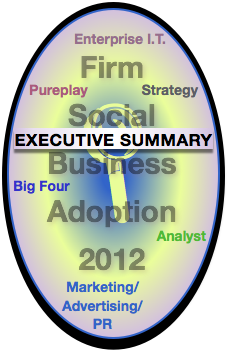 Advisory & Services Firm Social Business Adoption 2012 is a research survey that looks at social business advisory/consulting firms in a new way. Using quantitative methods, I compared consultancies according to the needs of clients who want to transform their organizations with social business. The twelve metrics measure firms’ performance in business impact, sociality, and transformation areas, and they rank firms within firm categories and overall. Advisory & Services Firm Social Business Adoption 2012 is a research survey that looks at social business advisory/consulting firms in a new way. Using quantitative methods, I compared consultancies according to the needs of clients who want to transform their organizations with social business. The twelve metrics measure firms’ performance in business impact, sociality, and transformation areas, and they rank firms within firm categories and overall.
Now prospective clients can compare Strategy firms, Big Four firms, Agencies, Analysts, Enterprise IT firms, and Pureplays quantitatively. Moreover, consulting firms can use these metrics for guidance in building out their social business practices.
I launched CSRA in 2006, and we have always practiced social business as transformation. Client work in social business transformation enables me to see where the market is going, so this survey considers social business firms from that future state.
[UPDATE 8 Mar] Now available: “Executive Briefing” is even more summarized (14-slides) in two versions: Guidance for Clients and Guidance for Firms. Research survey results will be most useful if you […]
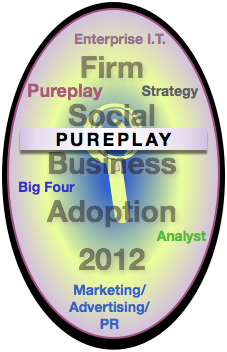 Pureplays address social business as transformation by definition because they have been launched to address emerging market needs that established players either do not yet understand or have yet to organize to address. Moreover, Pureplays are not adding social business to their existing services; they have been formed to practice social business. They are a small cohort in this research survey because they were constrained to social business and transformation as were advisory firms in other categories. Pureplays address social business as transformation by definition because they have been launched to address emerging market needs that established players either do not yet understand or have yet to organize to address. Moreover, Pureplays are not adding social business to their existing services; they have been formed to practice social business. They are a small cohort in this research survey because they were constrained to social business and transformation as were advisory firms in other categories.
Pureplay firms are often smallish startups, so they are quite limited in some areas when compared to established legacy firms as in this research survey. From a market and client perspective, Pureplays represent a vital part of the market and can offer unique capabilities; however, clients need to approach them with “eyes wide open” because the way they serve clients varies considerably.
There are thousands of social media advisory Pureplay firms that are focused on marketing and promotion. Pureplays’ capabilities are largely colored by their founders’ backgrounds. Dachis Group, SideraWorks and SocialxDesign directly […]
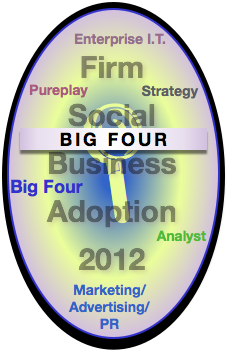 [UPDATED] The Big Four accountancies have been rebuilding their advisory practices for the past several years, and social business transformation fits with their core competencies in important ways. Like Strategy firms, they have been watching adoption and producing thought leadership on various aspects of social technologies’ relevance to business. Their approach also resembles that of strategy firms in that they have relatively low evidence of social business practice. [UPDATED] The Big Four accountancies have been rebuilding their advisory practices for the past several years, and social business transformation fits with their core competencies in important ways. Like Strategy firms, they have been watching adoption and producing thought leadership on various aspects of social technologies’ relevance to business. Their approach also resembles that of strategy firms in that they have relatively low evidence of social business practice.
Big Four firms are well positioned to evolve into social business consultancies because they have core competencies in business strategy and business process transformation. However, they will be challenged by their relative lack of core communications skills and awareness of “soft” social, people and behavioral knowledge.
Deloitte has been an early adopter of social business as a concept, perhaps because it did not shed its consulting practice in the early 2000s as all others did. PwC acquired boutique social business consultancy Ant’s Eye View in 2012, which shows its intention to integrate social business more deeply into its Customer Impact practice.
[…]
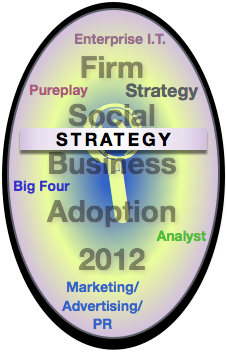 [UPDATED] Strategy firms are the most trusted names sought by CEOs and boards of directors who are reevaluating their companies’ identities, strategies and operations. Strategy firms have been making measured investments in social business over the last few years. Their knowledge of enterprise transformation is deep and broad, and they all have proprietary methodologies for most aspects of the strategy and transformation life cycle. They have deep and broad expertise in market analysis, competitive analysis corporate core competency analysis and virtually all aspects of operations. Many firms have large business transformation practices that explicitly guide clients through profound redefinition and change. [UPDATED] Strategy firms are the most trusted names sought by CEOs and boards of directors who are reevaluating their companies’ identities, strategies and operations. Strategy firms have been making measured investments in social business over the last few years. Their knowledge of enterprise transformation is deep and broad, and they all have proprietary methodologies for most aspects of the strategy and transformation life cycle. They have deep and broad expertise in market analysis, competitive analysis corporate core competency analysis and virtually all aspects of operations. Many firms have large business transformation practices that explicitly guide clients through profound redefinition and change.
Strategy firms have extensive core competencies that could enable them to offer social business strategy services. In addition, Strategy firms are significant producers of thought leadership relevant to corporate and business strategy as well as operations. Most firms field high quality management journals whose papers are written by their consultants. Many have research boutiques or even full-fledged businesses for research and thought leadership. However, they are challenged by very conservative […]
![Social Media Upgrade [Social Business Team Building] case1](http://rollyson.net/wp-content/uploads/2013/04/sbtb1.png) [Updated] The Social Media Upgrade applies to most consumer-oriented brands that have been outsourcing much of their social media work to agencies. In 2013, digital marketing and brand executives are thinking about building their internal teams to provide more continuity and scale. [Updated] The Social Media Upgrade applies to most consumer-oriented brands that have been outsourcing much of their social media work to agencies. In 2013, digital marketing and brand executives are thinking about building their internal teams to provide more continuity and scale.
Social Media Upgrade is the first of the five-part social business team building series The series describes team building in the context of various scenarios in which firms build social business capability, step by step, while investing wisely. Social Business Strategy Use Cases outlines and compares all five use cases while Social Business Team Building gives general guidance for how to create social business teams as well as recommendations for what characteristics leaders have, so I recommend reading them, too.
[…]
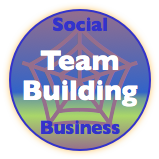 [UPDATED] Several times over the past few years, I have been contacted by major brands to advise them on finding a “social media executive” to help them “figure out social media” and “create a strategy.” In 2012, many firms began building social media teams in earnest, and this trend will continue to grow in the years ahead. Firms are also bringing “social media work” inside after having outsourced it to agencies. All of my client work has involved helping clients to build social business competency and teams, so here I’ll offer some pointers for how to build teams and avoid the pitfalls most companies experience. [UPDATED] Several times over the past few years, I have been contacted by major brands to advise them on finding a “social media executive” to help them “figure out social media” and “create a strategy.” In 2012, many firms began building social media teams in earnest, and this trend will continue to grow in the years ahead. Firms are also bringing “social media work” inside after having outsourced it to agencies. All of my client work has involved helping clients to build social business competency and teams, so here I’ll offer some pointers for how to build teams and avoid the pitfalls most companies experience.
Although each organization’s culture is different, the CEO, CDO, CMO or CAO will be happier with the social business investment if s/he doesn’t invest far ahead of return on investment, which remains low at firms that insist on “business-meaningful” metrics, not the PR- or “brand-building” variety. It’s a chicken-and-egg challenge: how do you know what kind of team to build until you’re achieving real business-meaningful returns on your social business initiatives?
[…]
 Branch disruption enables unusual opportunity for bank executives who consider transforming their relationships with clients. More generally, retail banking provides an excellent example of an Industrial Economy industry whose services are facing commoditization and weakening profits due to the waning of the Productized Channel of Value. In 2013, bank branch networks are under intense scrutiny because they are expensive, and client visits have been falling steadily for several years as e-banking and m-banking adoption have accelerated. Astute banks will use branches to transform their client relationships by leveraging the Social Channel. Here’s how they will do it. Branch disruption enables unusual opportunity for bank executives who consider transforming their relationships with clients. More generally, retail banking provides an excellent example of an Industrial Economy industry whose services are facing commoditization and weakening profits due to the waning of the Productized Channel of Value. In 2013, bank branch networks are under intense scrutiny because they are expensive, and client visits have been falling steadily for several years as e-banking and m-banking adoption have accelerated. Astute banks will use branches to transform their client relationships by leveraging the Social Channel. Here’s how they will do it.
[…]
 Next Door Chicago is a newish concept for State Farm Insurance that’s a great example of social business in insurance. It differentiates the firm by interacting in the Social Channel. The Lincoln Park/Lakeview community center and coworking space is notable because its DNA is empowering people to improve their lives through financial education. Next Door offers free coworking space and wifi, classes on financial management that are free of product pitches, free events (some financial, some art showings and other diverse events), free conference rooms and an energetic environment. Only the optional coffee bar is paid. Next Door Chicago is a newish concept for State Farm Insurance that’s a great example of social business in insurance. It differentiates the firm by interacting in the Social Channel. The Lincoln Park/Lakeview community center and coworking space is notable because its DNA is empowering people to improve their lives through financial education. Next Door offers free coworking space and wifi, classes on financial management that are free of product pitches, free events (some financial, some art showings and other diverse events), free conference rooms and an energetic environment. Only the optional coffee bar is paid.
Next Door’s main online presence is oriented toward free membership. Members can book space, sign up for classes and hold events. Here’s IDEO’s case study on the concept and design process.
[…]
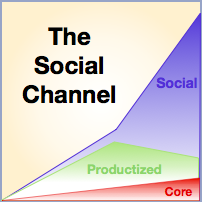 The Social Channel of Value explains our era’s drivers of economic transformation and how leaders can use them to strengthen their careers, organizations and communities. Profound shifts in human beings’ means of production restructure society and business because they alter the amount of “value” human work can create as well as the type of “products” that encapsulate people’s work. Individuals and organizations that notice, observe and understand these shifts early on can improve their relevance and competitiveness. Many of those that do not respond quickly enough go down with the ship. The Social Channel of Value explains our era’s drivers of economic transformation and how leaders can use them to strengthen their careers, organizations and communities. Profound shifts in human beings’ means of production restructure society and business because they alter the amount of “value” human work can create as well as the type of “products” that encapsulate people’s work. Individuals and organizations that notice, observe and understand these shifts early on can improve their relevance and competitiveness. Many of those that do not respond quickly enough go down with the ship.
Since the Social Channel is so important, I have published the Social Channel Trilogy, which is summarized here. Find even more information on the Social Channel home page.
[…]
 Social business policy (social media policy) engagements are some of the most interesting, revealing and critical engagements CSRA has done. Of course, organizations’ main motivation for creating social business policies is protecting themselves against possible legal threats caused by employee interactions online; however, a far greater threat is overemphasizing the legal threat and sabotaging employee engagement online. Well researched and crafted social business policy increases trust between the employer and employees—and among employees, leading to more appropriate online interactions, which burnish the firm’s reputation. Here, I’ll outline how you can use the process of creating the policy to manage legal exposure while increasing employees’ trust and productive social business activity. Social business policy (social media policy) engagements are some of the most interesting, revealing and critical engagements CSRA has done. Of course, organizations’ main motivation for creating social business policies is protecting themselves against possible legal threats caused by employee interactions online; however, a far greater threat is overemphasizing the legal threat and sabotaging employee engagement online. Well researched and crafted social business policy increases trust between the employer and employees—and among employees, leading to more appropriate online interactions, which burnish the firm’s reputation. Here, I’ll outline how you can use the process of creating the policy to manage legal exposure while increasing employees’ trust and productive social business activity.
[…]
|
|
 Advisory & Services Firm Social Business Adoption 2012 is a research survey that looks at social business advisory/consulting firms in a new way. Using quantitative methods, I compared consultancies according to the needs of clients who want to transform their organizations with social business. The twelve metrics measure firms’ performance in business impact, sociality, and transformation areas, and they rank firms within firm categories and overall.
Advisory & Services Firm Social Business Adoption 2012 is a research survey that looks at social business advisory/consulting firms in a new way. Using quantitative methods, I compared consultancies according to the needs of clients who want to transform their organizations with social business. The twelve metrics measure firms’ performance in business impact, sociality, and transformation areas, and they rank firms within firm categories and overall.
 Pureplays address social business as transformation by definition because they have been launched to address emerging market needs that established players either do not yet understand or have yet to organize to address. Moreover, Pureplays are not adding social business to their existing services; they have been formed to practice social business. They are a small cohort in this research survey because they were constrained to social business and transformation as were advisory firms in other categories.
Pureplays address social business as transformation by definition because they have been launched to address emerging market needs that established players either do not yet understand or have yet to organize to address. Moreover, Pureplays are not adding social business to their existing services; they have been formed to practice social business. They are a small cohort in this research survey because they were constrained to social business and transformation as were advisory firms in other categories. [UPDATED] The Big Four accountancies have been rebuilding their advisory practices for the past several years, and social business transformation fits with their core competencies in important ways. Like Strategy firms, they have been watching adoption and producing thought leadership on various aspects of social technologies’ relevance to business. Their approach also resembles that of strategy firms in that they have relatively low evidence of social business practice.
[UPDATED] The Big Four accountancies have been rebuilding their advisory practices for the past several years, and social business transformation fits with their core competencies in important ways. Like Strategy firms, they have been watching adoption and producing thought leadership on various aspects of social technologies’ relevance to business. Their approach also resembles that of strategy firms in that they have relatively low evidence of social business practice. [UPDATED] Strategy firms are the most trusted names sought by CEOs and boards of directors who are reevaluating their companies’ identities, strategies and operations. Strategy firms have been making measured investments in social business over the last few years. Their knowledge of enterprise transformation is deep and broad, and they all have proprietary methodologies for most aspects of the strategy and transformation life cycle. They have deep and broad expertise in market analysis, competitive analysis corporate core competency analysis and virtually all aspects of operations. Many firms have large business transformation practices that explicitly guide clients through profound redefinition and change.
[UPDATED] Strategy firms are the most trusted names sought by CEOs and boards of directors who are reevaluating their companies’ identities, strategies and operations. Strategy firms have been making measured investments in social business over the last few years. Their knowledge of enterprise transformation is deep and broad, and they all have proprietary methodologies for most aspects of the strategy and transformation life cycle. They have deep and broad expertise in market analysis, competitive analysis corporate core competency analysis and virtually all aspects of operations. Many firms have large business transformation practices that explicitly guide clients through profound redefinition and change.![Social Media Upgrade [Social Business Team Building] case1](http://rollyson.net/wp-content/uploads/2013/04/sbtb1.png) [Updated] The Social Media Upgrade applies to most consumer-oriented brands that have been outsourcing much of their social media work to agencies. In 2013, digital marketing and brand executives are thinking about building their internal teams to provide more continuity and scale.
[Updated] The Social Media Upgrade applies to most consumer-oriented brands that have been outsourcing much of their social media work to agencies. In 2013, digital marketing and brand executives are thinking about building their internal teams to provide more continuity and scale. [UPDATED] Several times over the past few years, I have been contacted by major brands to advise them on finding a “social media executive” to help them “figure out social media” and “create a strategy.” In 2012, many firms began building social media teams in earnest, and this trend will continue to grow in the years ahead. Firms are also bringing “social media work” inside after having outsourced it to agencies. All of my client work has involved helping clients to build social business competency and teams, so here I’ll offer some pointers for how to build teams and avoid the pitfalls most companies experience.
[UPDATED] Several times over the past few years, I have been contacted by major brands to advise them on finding a “social media executive” to help them “figure out social media” and “create a strategy.” In 2012, many firms began building social media teams in earnest, and this trend will continue to grow in the years ahead. Firms are also bringing “social media work” inside after having outsourced it to agencies. All of my client work has involved helping clients to build social business competency and teams, so here I’ll offer some pointers for how to build teams and avoid the pitfalls most companies experience. Branch disruption enables unusual opportunity for bank executives who consider transforming their relationships with clients. More generally, retail banking provides an excellent example of an Industrial Economy industry whose services are facing commoditization and weakening profits due to the waning of the Productized Channel of Value. In 2013, bank branch networks are under intense scrutiny because they are expensive, and client visits have been falling steadily for several years as e-banking and m-banking adoption have accelerated. Astute banks will use branches to transform their client relationships by leveraging the Social Channel. Here’s how they will do it.
Branch disruption enables unusual opportunity for bank executives who consider transforming their relationships with clients. More generally, retail banking provides an excellent example of an Industrial Economy industry whose services are facing commoditization and weakening profits due to the waning of the Productized Channel of Value. In 2013, bank branch networks are under intense scrutiny because they are expensive, and client visits have been falling steadily for several years as e-banking and m-banking adoption have accelerated. Astute banks will use branches to transform their client relationships by leveraging the Social Channel. Here’s how they will do it. Next Door Chicago is a newish concept for State Farm Insurance that’s a great example of social business in insurance. It differentiates the firm by interacting in the Social Channel. The Lincoln Park/Lakeview community center and coworking space is notable because its DNA is empowering people to improve their lives through financial education. Next Door offers free coworking space and wifi, classes on financial management that are free of product pitches, free events (some financial, some art showings and other diverse events), free conference rooms and an energetic environment. Only the optional coffee bar is paid.
Next Door Chicago is a newish concept for State Farm Insurance that’s a great example of social business in insurance. It differentiates the firm by interacting in the Social Channel. The Lincoln Park/Lakeview community center and coworking space is notable because its DNA is empowering people to improve their lives through financial education. Next Door offers free coworking space and wifi, classes on financial management that are free of product pitches, free events (some financial, some art showings and other diverse events), free conference rooms and an energetic environment. Only the optional coffee bar is paid. The Social Channel of Value explains our era’s drivers of economic transformation and how leaders can use them to strengthen their careers, organizations and communities. Profound shifts in human beings’ means of production restructure society and business because they alter the amount of “value” human work can create as well as the type of “products” that encapsulate people’s work. Individuals and organizations that notice, observe and understand these shifts early on can improve their relevance and competitiveness. Many of those that do not respond quickly enough go down with the ship.
The Social Channel of Value explains our era’s drivers of economic transformation and how leaders can use them to strengthen their careers, organizations and communities. Profound shifts in human beings’ means of production restructure society and business because they alter the amount of “value” human work can create as well as the type of “products” that encapsulate people’s work. Individuals and organizations that notice, observe and understand these shifts early on can improve their relevance and competitiveness. Many of those that do not respond quickly enough go down with the ship. Social business policy (social media policy) engagements are some of the most interesting, revealing and critical engagements CSRA has done. Of course, organizations’ main motivation for creating social business policies is protecting themselves against possible legal threats caused by employee interactions online; however, a far greater threat is overemphasizing the legal threat and sabotaging employee engagement online. Well researched and crafted social business policy increases trust between the employer and employees—and among employees, leading to more appropriate online interactions, which burnish the firm’s reputation. Here, I’ll outline how you can use the process of creating the policy to manage legal exposure while increasing employees’ trust and productive social business activity.
Social business policy (social media policy) engagements are some of the most interesting, revealing and critical engagements CSRA has done. Of course, organizations’ main motivation for creating social business policies is protecting themselves against possible legal threats caused by employee interactions online; however, a far greater threat is overemphasizing the legal threat and sabotaging employee engagement online. Well researched and crafted social business policy increases trust between the employer and employees—and among employees, leading to more appropriate online interactions, which burnish the firm’s reputation. Here, I’ll outline how you can use the process of creating the policy to manage legal exposure while increasing employees’ trust and productive social business activity.